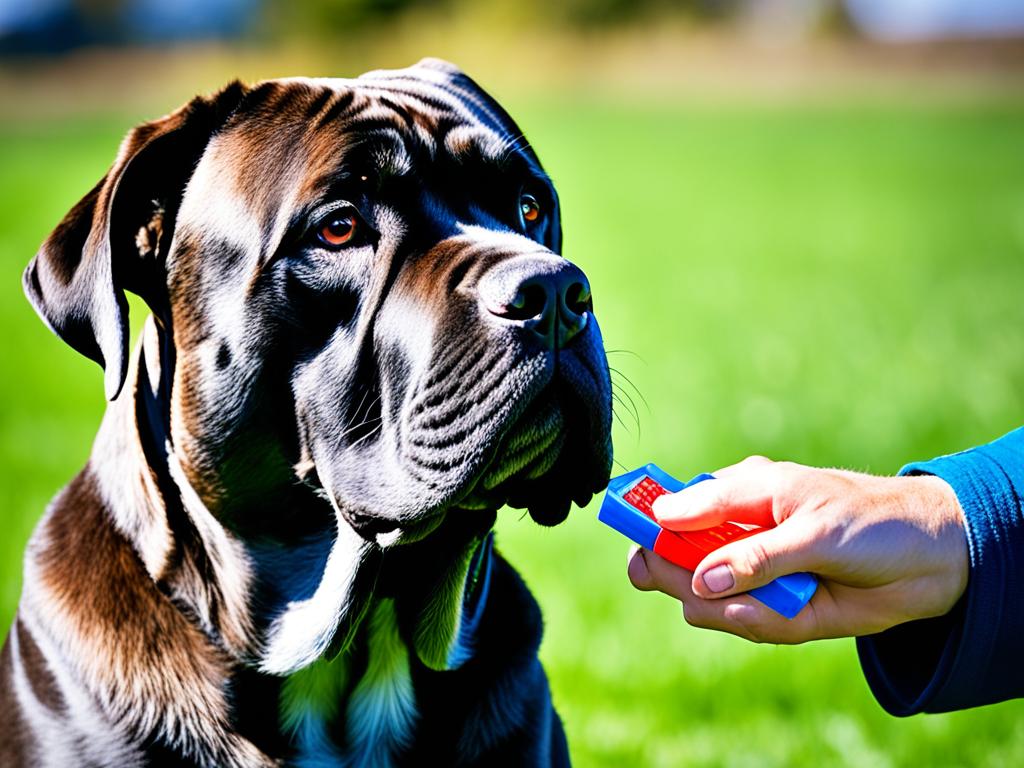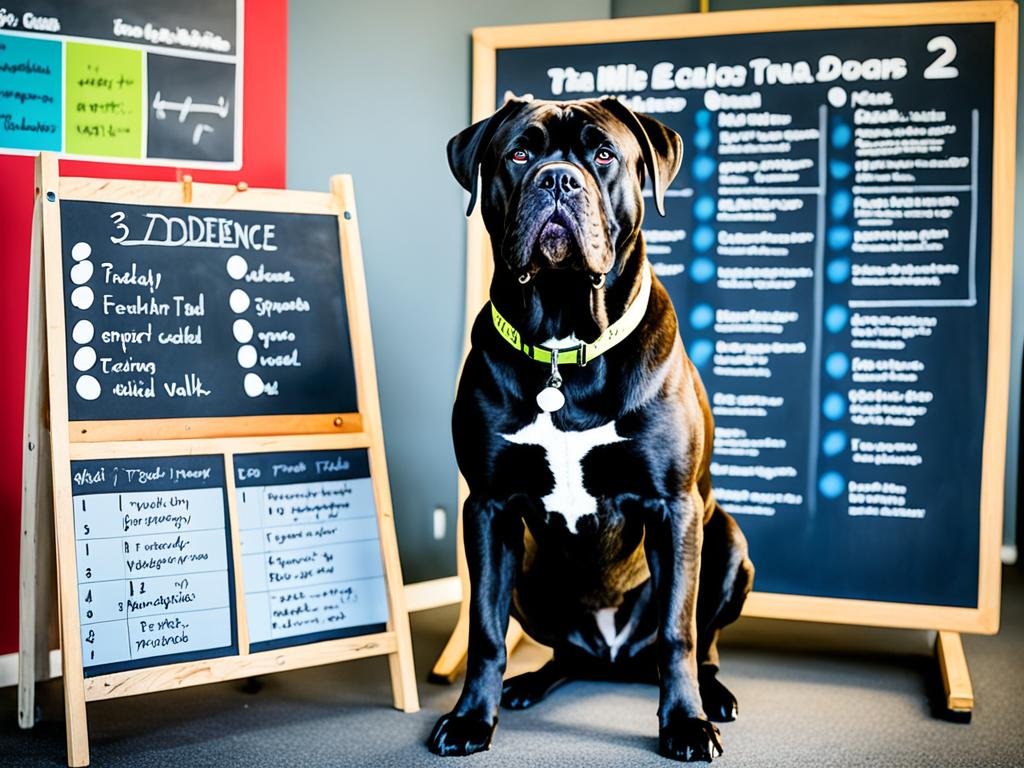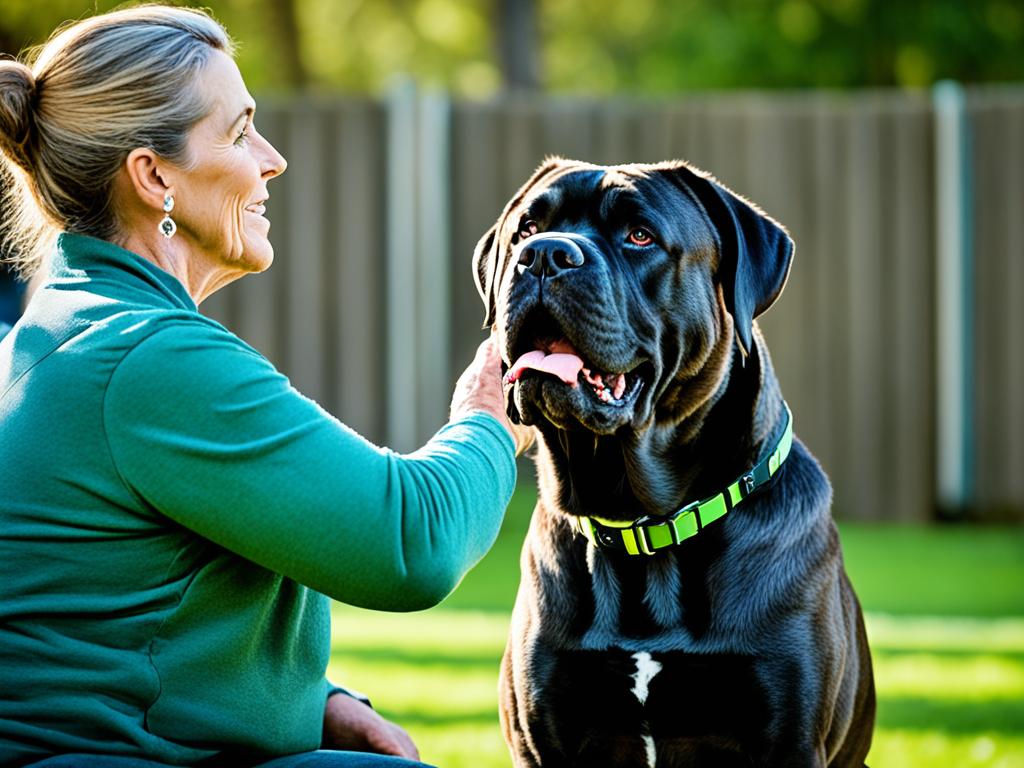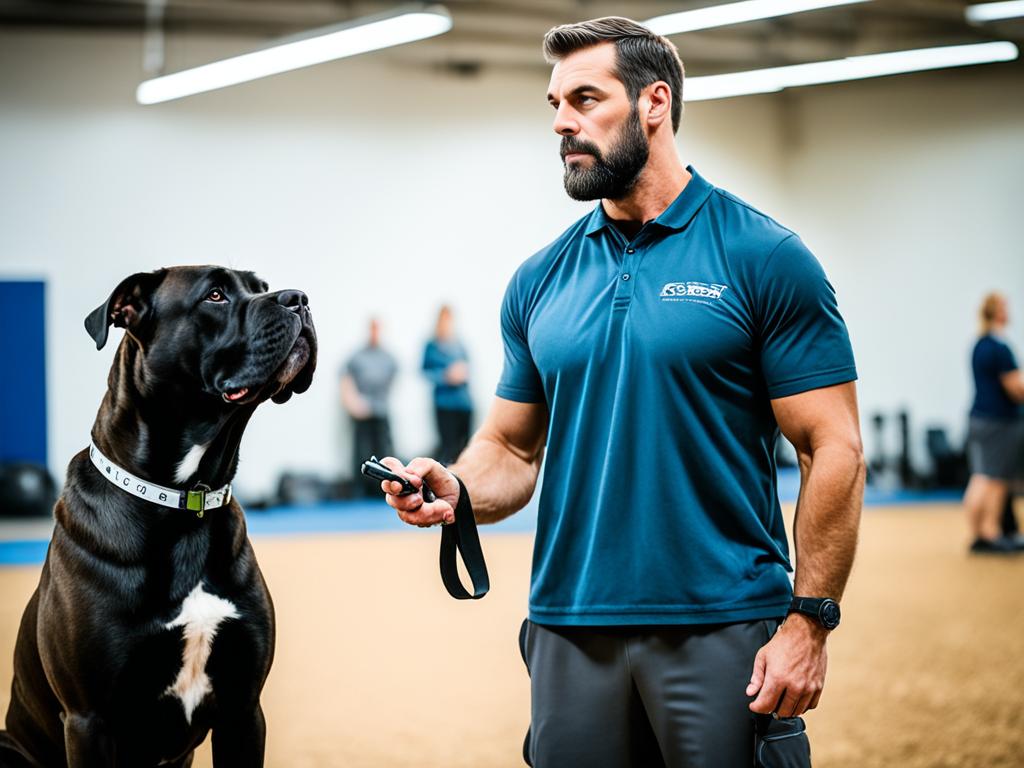An astonishing 40% of dog owners do not engage in any obedience training with their pets, a statistic that becomes profoundly concerning when considering breeds like the Cane Corso. Known for their imposing stature and protective instincts, these majestic dogs can weigh well over 100 pounds, making Cane Corso obedience training not a luxury but a necessity for a harmonious coexistence with humans. Establishing a firm yet friendly bond, adopting suitable Cane Corso training techniques, and maintaining a well-structured Cane Corso training program are pivotal steps to transform these intelligent canines from unruly giants into obedient companions.
Key Takeaways
- Size and strength make obedience training a critical requirement for Cane Corso owners.
- Positive reinforcement is a cornerstone of effective Cane Corso training practices.
- A tailored training program is vital to address the unique needs of this intelligent breed.
- The connection between owner and pet strengthens through consistent, strategic training sessions.
- Preventative training addresses potential behavioral challenges before they arise.
- Resources such as Bully Girl Magazine and specialized apps offer additional support for Cane Corso care and training.
Understanding the Cane Corso Temperament and Communication
To foster an effective and nurturing relationship with a Cane Corso, it’s important to comprehend their distinct temperament. Known for their loyalty and protective nature, Cane Corsos are intelligent and eager to please. However, their behavior can be a complex tapestry reflecting their mood and overall well-being. Understanding their unique forms of communication is a cornerstone of successful Cane Corso behavior training, essential during their pivotal Cane Corso puppy training phase, and is beneficial throughout their lives.
Observing a Cane Corso’s body language, from a wagging tail to raised hackles, provides invaluable insight into their emotions. Recognizing these cues enables owners to adjust their Cane Corso training tips accordingly, promoting a well-adjusted and content companion.
Recognizing Signs of Happiness and Discomfort
Cane Corsos exhibit certain behaviors that signal contentment or discomfort. A relaxed stance and easy tail wag indicate a happy dog. Conversely, stiffness and averted gaze may signal unease or distress. Timely interpretation of these signs supports effective intervention and training efforts.
Identifying and Addressing Stress or Anxiety
- Excessive licking or panting can be early indicators of stress or anxiety.
- Understanding the root of these behaviors is key to providing calm reassurance and preventing future behavioral problems.
- Consistent, positive training sessions can mitigate stress, solidifying trust between the dog and its handler.
Integrating these observations and actions into daily interactions ensures a pathway to nurturing a balanced and communicative Cane Corso.
| Behavior | Meaning | Training Tip |
|---|---|---|
| Relaxed body with an open mouth | Contentment | Reinforce with praise to encourage a relaxed demeanor. |
| Ears pinned back and low whining | Discomfort or anxiety | Identify stressors and introduce positive distractions or soothing interactions. |
| Stiff body with direct eye contact | Potential aggression | Diffuse tension with calm commands and remove from threatening environment. |
The Importance of Socialization for Your Cane Corso
For a Cane Corso owner, understanding the breed’s need for socialization is as fundamental as Cane Corso behavior training itself. Introducing your Cane Corso to a variety of experiences early in life is crucial to moulding a calm and confident dog. Socialization involves not only exposure to different people and animals but also familiarization with various environments and sounds. This initiative plays a pivotal role in preventing future aggression and anxiety, facilitating a sociable and well-adjusted pet.
Often, owners seek guidance on Cane Corso training near me, looking for local expertise in guiding their dogs through these critical experiences. Professional trainers can provide structured environments where controlled exposure to diverse scenarios is possible. However, owners can also take the initiative, ensuring that their Cane Corso commands respect, not through intimidation, but through respectful acknowledgment of their leadership.
Creating a checklist of socialization goals can be an effective strategy for owners. This should include a variety of stimuli your Cane Corso should become comfortable with:
- Different types of people and clothing
- Various animal species and sizes
- Urban and rural settings
- Different sounds and smells
- Vehicles and public transport
To assist in the socialization process, consider creating a table that outlines goals and achievements:
| Age Range | Socialization Goals | Achievements |
|---|---|---|
| 8-12 weeks | Exposure to immediate family, household sounds, first vet visit | Familiar with home environment, comfortable with family members |
| 3-6 months | Introduction to close friends, visiting pet-friendly stores, short car trips | Interacts well with guests, behaves calmly in public settings |
| 6-12 months | Meeting larger groups of people, encountering different species of animals, attending dog training classes | Stays composed in crowds, shows appropriate interest in other animals, learns basic commands |
| 1 year+ | Continued exposure to varied and new experiences, consistency in training routines | Adjusts quickly to new situations, obeys commands in any environment |
As part of comprehensive Cane Corso behavior training, socialization is not a phase but a continuous process. As your Cane Corso matures, ongoing exposure to new experiences will perpetuate their adaptability and equilibrium. Always strive for gradual, positive introductions, remembering that every new encounter is an opportunity to reinforce good behaviors and the execution of Cane Corso commands.
Essential Cane Corso Obedience Commands
Training a Cane Corso puppy requires patience, consistency, and a clear understanding of the fundamental commands that form the backbone of canine obedience. Starting early is key to harnessing their natural abilities and molding a well-behaved adult dog. Let’s explore the core commands and advanced signals to enrich your Cane Corso’s training regimen.
Mastering the Basic Sit, Stay, and Come Commands
For new Cane Corso owners, getting the basics right sets the stage for advanced training. Using clear and concise Cane Corso commands alongside a system of positive reinforcement, the fundamentals of ‘sit’, ‘stay’, and ‘come’ become the pillars of an obedient Cane Corso. It is essential to infuse these sessions with plenty of praises and treats to make the training a positive experience for your pup.
- Sit: Essential for getting your Cane Corso to stop and pay attention.
- Stay: Keeps your dog stationary when you need to pause during activities.
- Come: Vital for recall to ensure your dog returns when called.
Advanced Hand Signals and Verbal Cues
Beyond the basics, trainers recommend incorporating hand signals and verbal cues for advanced control and understanding. Integrating these sophisticated forms of communication is incredibly effective, especially during Cane Corso training classes, where dogs are challenged to focus despite distractions.
| Command | Hand Signal | Verbal Cue | Training Benefit |
|---|---|---|---|
| Down | Hand moving downward | “Down” | Encourages calm behavior and submission |
| Heel | Tap side of leg | “Heel” | Keeps your Cane Corso close during walks |
| Leave It | Hand out, palm facing dog | “Leave it” | Prevents dog from engaging with distractions |
As you progress with Cane Corso puppy training, remember that each pup has a unique learning curve. Ensure that your Cane Corso is comfortable and responsive to both basic and advanced commands to cultivate a reliable and safe companion.
Cane Corso Obedience Training: Using Positive Reinforcement
When training a Cane Corso, the method of positive reinforcement is not just a choice; it is a strategy that can yield remarkable results. This approach, heavily supported by canine behavioral science, involves rewarding the dog immediately following a correctly performed action. Treats, verbal accolades, and playtime serve as reinforcements that encourage your Cane Corso to exhibit the desired behavior more frequently, laying a foundation for enduring obedience.
In the context of Cane Corso training classes, where individual attention might be less feasible, positive reinforcement establishes an environment where learning is associated with pleasure and achievement. Utilizing this method within a structured Cane Corso training program can dramatically improve the likelihood of your pet retaining the commands being taught.

For those implementing these Cane Corso training tips at home, here is a table that offers a simple breakdown of what an effective positive reinforcement schedule could look like:
| Command Taught | Type of Positive Reinforcement | Frequency of Reward | Expected Outcome |
|---|---|---|---|
| Sit | Treat | Every successful attempt | Consistent sitting on command |
| Stay | Praise | Gradually increase intervals between rewards | Longer stay duration |
| Come | Playtime | Initially often, then intermittently | Reliable recall |
| Down | Treat and Praise | Every successful attempt, then randomly | Quick to lie down with less prompting |
Remember to keep training sessions diverse and engaging. Reward types should vary to keep your Cane Corso keen and responsive. An excessive focus on one type of reward can lead to diminishing returns. Hence, drafting a well-rounded Cane Corso training program that incorporates different positive reinforcers will significantly boost your training efforts.
- Use high-value treats to capture and maintain attention during the initial stages of training.
- Gradually introduce secondary reinforcers like verbal praise and petting, which are more practical in different situations.
- Ensure the rewards are administered immediately after the correct behavior to strengthen the association.
- Reduce the frequency of treats over time; continuous rewards can lead to expectation rather than learning.
Embedding these techniques into your daily interaction with your Cane Corso not only fosters obedience but also enhances your bond, promoting a harmonious and responsive companionship.
Leash Training Your Cane Corso for Safety and Control
When it comes to Cane Corso leash training, initiating the process early on is paramount. The imposing stature of the Cane Corso necessitates expert Cane Corso behavior training to ensure the safety of both the dog and everyone around it. It is essential to introduce the leash gradually to your Cane Corso, seamlessly transitioning from initial wear in the home to guided walks in a secure environment.
For those seeking Cane Corso training near me, it’s advisable to start with short, positive sessions that reinforce good behavior on the leash. Rewarding your canine companion for maintaining a relaxed demeanor and not pulling is critical to establishing desirable walking etiquette. To achieve a consistent walking pace and to manage the tugs common with a strong breed like the Cane Corso, firm yet gentle guidance is necessary.
| Leash Training Step | Techniques | Rewards for Positive Behavior |
|---|---|---|
| Initial Leash Introduction | Allow the Cane Corso to get comfortable by sniffing and wearing the leash at home. | Praise and treats for calm interaction with the leash. |
| Guided Walk Indoors | Begin with short walks in a familiar indoor setting to practice commands. | Verbal encouragement and the occasional treat for following commands. |
| Outdoor Leash Walking | Advance to outdoors, starting in less crowded areas to minimize distractions. | Playtime or a favorite activity after a successful outdoor walk. |
| Refining Walking Habits | Implement ‘heel’ and ‘no pull’ training during regular walks. | Treats or a coveted toy when the Cane Corso walks politely without pulling. |
By dedicating time to thoughtful leash training, owners will establish a foundation of respect between them and their Cane Corso, ensuring walks are pleasurable and controlled experiences. Remember that patience, consistency, and positive reinforcement are the threads that weave together a successful Cane Corso leash training program.
Creating a Consistent Training Schedule for Your Cane Corso
Efficient Cane Corso training techniques depend heavily on establishing a regular schedule that promotes consistency and structure. This creates an environment ripe for learning and adheres to the canine’s innate need for routine. By setting specific times for training sessions, meals, and exercise, your Cane Corso will not only learn faster but will also exhibit a calmer, more predictable behavior.

A carefully crafted Cane Corso training program will include a variety of activities that target different commands and behaviors, ensuring your dog remains engaged and does not become bored with repetitive tasks. A diverse schedule aids in reinforcing commands and enables efficient use of time and resources, maximizing the effectiveness of each session.
- Daily obedience drills to reinforce basic commands
- Weekly socialization outings to encourage well-rounded behavior
- Regular exercise routines to maintain physical health and focus
- Periodic reviews of training progress to adjust strategies as needed
Patience and persistence are key elements in successful Cane Corso training tips. When unexpected obstacles arise, as they inevitably will, being prepared to adapt while maintaining the overall structure will support your Cane Corso’s educational growth. Adhering to a consistent schedule not only benefits the training process but also significantly improves the overall wellbeing of your cherished companion.
Addressing Cane Corso Behavioral Issues: Biting and Aggression
When faced with the challenges of Cane Corso behavior training, specifically with biting and aggression, it’s important to delve deep into the causative factors behind these behaviors. Understanding what drives your Cane Corso to exhibit such actions is the first step towards effectively addressing and transforming their conduct.
Understanding the Root Causes of Aggressive Behaviors
Aggression in Cane Corsos can often be traced back to fundamental issues such as fear, a lack of proper socialization, or past negative experiences. Scenarios that induce stress or anxiety can trigger aggressive responses, which, while natural from a canine perspective, are unacceptable in domestic settings. To navigate through these behavioral challenges, a well-thought-out approach to Cane Corso puppy training is key.
Effective Techniques to Curb Unwanted Biting
Dealing with a biting Cane Corso requires patience and consistency. Since puppies explore their world with their mouths, bite inhibition training is critical. Offer them chew toys instead of your hand or a shoe, and always reinforce the behavior you want to see with positive rewards. Should your training efforts not yield the desired results, seeking professional help might be the best course of action.
- Redirect aggressive bites to appropriate toys
- Employ firm, consistent commands when biting occurs
- Reward calm, non-biting interactions with praise and treats
- Ensure regular, positive socialization experiences
- Consider professional training for persistent cases
Cane Corso Training Techniques for Effective Learning
Training a Cane Corso requires implementing effective learning strategies tailored to their intelligence and strength. Cane Corso training techniques should be grounded in the development of a strong relationship and trust between the dog and the owner. Leveraging the dynamic environment of Cane Corso training classes, owners can utilize proven methods to enhance communication and obedience.
Utilizing specific and consistent Cane Corso commands in a distraction-free environment is the first step in effective training. As the Cane Corso progresses, the training space should evolve to include various controlled distractions, which aids in reinforcing commands amidst potential real-life distractions.

Positive reinforcement is at the core of effective training, reinforcing desirable behaviors with rewards such as treats or praise. Mastering this approach encourages a Cane Corso to follow commands willingly and enthusiastically. Explore the table below for detailed insights into positive reinforcement techniques that can benefit your Cane Corso’s training routine.
| Technique | Description | Application in Training |
|---|---|---|
| Treat Reward | Rewards the Cane Corso with a small treat after successfully following a command. | Use to encourage immediate repetition of the correct behavior. |
| Praise | Verbal affirmation or petting to acknowledge the correct behavior. | Enhances the bond between the trainer and the Cane Corso, reinforcing good behavior. |
| Clicker Training | A sound-based reinforcement method that uses a clicker device to mark the desired behavior. | Trains the Cane Corso to associate the sound of the clicker with the desired action and eventual reward. |
| Playtime | Engages the Cane Corso in a preferred play activity as a reward. | Useful for incorporating training into a fun and stimulating context. |
- Initiate training sessions after a period of exercise to ensure your Cane Corso is attentive and not overly energetic.
- Consistently reinforce commands, even when your Cane Corso has mastered them, to maintain their response level.
- Gradually increase the level of distractions once your dog is reliably responding in a quiet environment.
Optimizing these techniques nurtures discipline and a strong command-response relationship that embodies the heart of a successful Cane Corso training program. As the capabilities of your Cane Corso expand, consider enrolling in advanced Cane Corso training classes for even more comprehensive skill development and training outcomes.
Advanced Cane Corso Training Classes and Activities
For Cane Corso enthusiasts looking to enhance their dog’s capabilities and strengthen their bond, advanced training classes and activities present an ideal pathway. These classes not only refine the skills acquired through basic obedience but also offer Cane Corsos a platform to explore their natural agility and aptitude for therapy work.
Challenging Your Cane Corso with Agility
Agility training is a dynamic and engaging way to put your Cane Corso’s speed, dexterity, and intelligence to the test. With Cane Corso agility training, these athletic dogs navigate obstacle courses that challenge their physical prowess while also sharpening their mental focus. The benefits of agility training include improved coordination, better control, and a fun way to release pent-up energy.
The Benefits of Therapy Dog Training for Cane Corsos
Cane Corso therapy dog training molds these protective and loyal canines into compassionate companions for individuals in need. These training programs equip Cane Corsos with the demeanor and sensitivity required to serve as therapy dogs, offering comfort and support to people in hospitals, schools, and nursing homes. This training not only provides a service to the community but also fosters a deep-rooted connection between the dog and handler.
Advanced Training Options
- Agility Courses & Tournament Preparation
- Intensive Therapy Dog Workshops
- Classes on Obedience and Precision Commands
- Sports Training, including Flyball and Tracking
| Activity Type | Skills Developed | Community Impact |
|---|---|---|
| Agility Training | Coordination, Fitness, Discipline | N/A |
| Therapy Dog Training | Sensitivity, Calmness, Compassion | High |
Participation in Cane Corso advanced training is more than a physical challenge; it’s an endeavor that enhances your dog’s overall well-being. Whether it’s threading through poles, jumping hurdles in an agility course, or calmly navigating crowded spaces as a therapy dog, each activity contributes to the shared journey of personal growth and mutual respect between a Cane Corso and its trainer.
Extending Training Beyond Obedience: Cane Corso’s Lifelong Learning
For the majestic and commanding Cane Corso, training is not just a phase, it’s a continuous journey. Lifelong learning is paramount, ensuring that the breed’s strong-willed nature remains channeled through respect and responsiveness. Enhancing a Cane Corso’s training program necessitates a commitment to consistent practice and growth. By continuously advancing their education, we not only uphold their obedience but also encourage good behavior patterns that become ingrained over time. This diligence in Cane Corso behavior training reinforces the bonds of leadership and companionship between owner and dog.
Furthermore, individual behavioral challenges should not be overlooked. These may arise as your Cane Corso matures and encounters new experiences. Addressing such issues promptly and efficiently prevents them from embedding into the dog’s temperament. Overcoming these challenges is made easier with the help of structured Cane Corso training programs designed to cater to the breed’s specific needs. Professional guidance, such as that provided by recognized online platforms like SpiritDog Training, offers expertise that can elevate a dog’s training to new levels of excellence, benefiting both the Cane Corso and its owner.
The concept of Cane Corso lifelong training goes beyond repetitive commands; it embraces the spirit of constant improvement and adaptive learning. It’s about creating a dynamic and engaging environment where your Cane Corso can thrive and adapt. As they mature, they are not just trained, but educated – a distinction that results in a well-rounded, confident, and obedient companion ready to face life’s complexities with unwavering loyalty and intelligence.
FAQ
What Are the Key Elements of Cane Corso Obedience Training?
Key elements include establishing a strong bond between the owner and dog, using positive reinforcement, starting with basic commands, and advancing to complex tasks. Consistency, patience, and understanding the breed’s temperament are crucial.
How Can I Understand My Cane Corso’s Temperament and Communicate Effectively?
Observe your Cane Corso’s body language and vocal cues. Signs of happiness include a relaxed stance and wagging tail, while discomfort may show as stiffness or aggression. Early signs of stress should be addressed immediately for effective communication and training.
Why Is Socialization Important in Training My Cane Corso?
Socialization is essential for preventing aggression and fearfulness, promoting confidence, and helping your Cane Corso adapt to diverse environments and situations.
What Are the Basic Commands Every Cane Corso Should Know?
Every Cane Corso should know basic commands such as “sit,” “stay,” “come,” “heel,” and “down.” These foundational commands help manage your dog’s behavior and ensure their safety.
How Can I Use Positive Reinforcement in My Cane Corso’s Training?
Utilize treats, praise, and play as immediate rewards for correct behavior. This reinforces desired actions and encourages your Cane Corso to repeat them, fostering a positive training environment.
Why Is Leash Training Important for My Cane Corso?
Leash training is critical for controlling a large and powerful breed like the Cane Corso, ensuring they walk without pulling or lunging and promoting safety for both the dog and the community.
How Can I Create an Effective Training Schedule for My Cane Corso?
Establish a clear and consistent routine, following a structured training program that includes regular practice times. Consistency in training fosters discipline and understanding of expected behaviors.
How Do I Address Biting and Aggression in My Cane Corso?
Understand the underlying reasons for such behaviors, which can include fear or insufficient socialization. Employ positive reinforcement and provide appropriate outlets for biting, such as supervised play and chew toys. For severe issues, seek professional help.
What Advanced Training Classes Can Benefit My Cane Corso?
Advanced training options like agility can provide mental and physical stimulation, improve discipline, and strengthen your bond. Therapy dog training also offers emotional benefits and a sense of purpose for both dog and owner.
How Do I Ensure My Cane Corso Continues Learning Beyond Basic Obedience?
Maintain consistent practice, address individual behavioral issues, and explore avenues for advanced learning such as professional online courses. Lifelong training keeps your Cane Corso mentally engaged and well-behaved.
Are There Any Recommended Resources for Furthering My Cane Corso’s Training?
Bully Girl Magazine, as well as mobile applications available on Apple and Google Play, are great resources for insights into Cane Corso care and advanced training techniques.

Leave a Reply